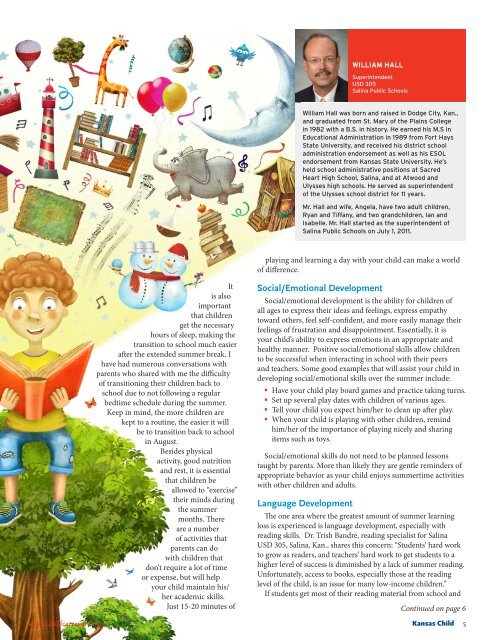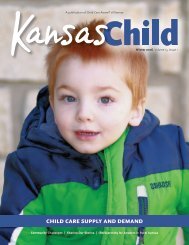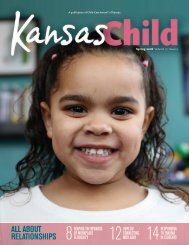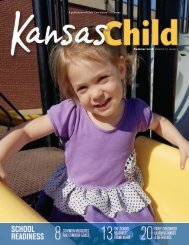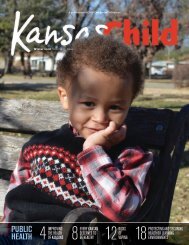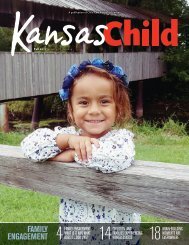2016 Summer Kansas Child
Summer fun and safety
Summer fun and safety
You also want an ePaper? Increase the reach of your titles
YUMPU automatically turns print PDFs into web optimized ePapers that Google loves.
WILLIAM HALL<br />
Superintendent<br />
USD 305<br />
Salina Public Schools<br />
William Hall was born and raised in Dodge City, Kan.,<br />
and graduated from St. Mary of the Plains College<br />
in 1982 with a B.S. in history. He earned his M.S in<br />
Educational Administration in 1989 from Fort Hays<br />
State University, and received his district school<br />
administration endorsement as well as his ESOL<br />
endorsement from <strong>Kansas</strong> State University. He’s<br />
held school administrative positions at Sacred<br />
Heart High School, Salina, and at Atwood and<br />
Ulysses high schools. He served as superintendent<br />
of the Ulysses school district for 11 years.<br />
Mr. Hall and wife, Angela, have two adult children,<br />
Ryan and Tiffany, and two grandchildren, Ian and<br />
Isabelle. Mr. Hall started as the superintendent of<br />
Salina Public Schools on July 1, 2011.<br />
playing and learning a day with your child can make a world<br />
of difference.<br />
It<br />
is also<br />
important<br />
that children<br />
get the necessary<br />
hours of sleep, making the<br />
transition to school much easier<br />
after the extended summer break. I<br />
have had numerous conversations with<br />
parents who shared with me the difficulty<br />
of transitioning their children back to<br />
school due to not following a regular<br />
bedtime schedule during the summer.<br />
Keep in mind, the more children are<br />
kept to a routine, the easier it will<br />
be to transition back to school<br />
in August.<br />
Besides physical<br />
activity, good nutrition<br />
and rest, it is essential<br />
that children be<br />
allowed to “exercise”<br />
their minds during<br />
the summer<br />
months. There<br />
are a number<br />
of activities that<br />
parents can do<br />
with children that<br />
don’t require a lot of time<br />
or expense, but will help<br />
your child maintain his/<br />
her academic skills.<br />
Just 15-20 minutes of<br />
Social/Emotional Development<br />
Social/emotional development is the ability for children of<br />
all ages to express their ideas and feelings, express empathy<br />
toward others, feel self-confident, and more easily manage their<br />
feelings of frustration and disappointment. Essentially, it is<br />
your child’s ability to express emotions in an appropriate and<br />
healthy manner. Positive social/emotional skills allow children<br />
to be successful when interacting in school with their peers<br />
and teachers. Some good examples that will assist your child in<br />
developing social/emotional skills over the summer include:<br />
•§<br />
Have your child play board games and practice taking turns.<br />
•§<br />
Set up several play dates with children of various ages.<br />
•§<br />
Tell your child you expect him/her to clean up after play.<br />
•§<br />
When your child is playing with other children, remind<br />
him/her of the importance of playing nicely and sharing<br />
items such as toys.<br />
Social/emotional skills do not need to be planned lessons<br />
taught by parents. More than likely they are gentle reminders of<br />
appropriate behavior as your child enjoys summertime activities<br />
with other children and adults.<br />
Language Development<br />
The one area where the greatest amount of summer learning<br />
loss is experienced is language development, especially with<br />
reading skills. Dr. Trish Bandré, reading specialist for Salina<br />
USD 305, Salina, Kan., shares this concern: “Students’ hard work<br />
to grow as readers, and teachers’ hard work to get students to a<br />
higher level of success is diminished by a lack of summer reading.<br />
Unfortunately, access to books, especially those at the reading<br />
level of the child, is an issue for many low-income children.”<br />
If students get most of their reading material from school and<br />
Continued on page 6<br />
www.ks.childcareaware.org <strong>Kansas</strong> <strong>Child</strong> 5


